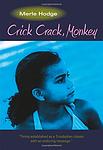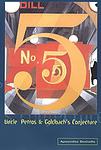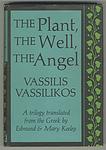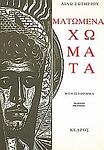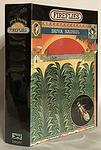The Greatest Trinidadian, Greek "Fiction" Books Since 1950
Click to learn how this list is calculated.
This list represents a comprehensive and trusted collection of the greatest books. Developed through a specialized algorithm, it brings together 300 'best of' book lists to form a definitive guide to the world's most acclaimed books. For those interested in how these books are chosen, additional details can be found on the rankings page.
Genres
Countries
Date Range
Reading Statistics
Click the button below to see how many of these books you've read!
Download
If you're interested in downloading this list as a CSV file for use in a spreadsheet application, you can easily do so by clicking the button below. Please note that to ensure a manageable file size and faster download, the CSV will include details for only the first 500 books.
Download-
1. A House for Mr. Biswas by V. S. Naipaul
The novel narrates the life of Mr. Biswas, a man of Indian descent living in Trinidad, who struggles against poverty and adversity to achieve personal independence and to build a home for himself and his family. Born into a poor family and married into an oppressive one, he constantly strives for autonomy and identity against the backdrop of post-colonial Trinidad. His dream of owning his own house becomes a symbol of his desire for self-determination and respect in a society that often denies him both.
-
2. A Bend in the River by V. S. Naipaul
"A Bend in the River" is a novel that follows an Indian man, Salim, who moves from the East Coast of Africa to the heart of the continent to open a store in a small, remote town at a bend in the river. The book explores the changes that occur in the town as it evolves from a sleepy outpost to a bustling city. It also delves into Salim's personal struggles and the challenges he faces in adapting to a rapidly changing society, all set against the backdrop of post-colonial Africa.
-
3. The Lonely Londoners by Sam Selvon
"The Lonely Londoners" is a novel that explores the lives of a group of West Indian immigrants living in London during the 1950s. The narrative follows the characters as they navigate the challenges of racism, poverty, and isolation in a new and unfamiliar environment. Despite their hardships, the characters also experience moments of camaraderie and humor, providing a nuanced portrayal of the immigrant experience.
-
4. The Last Temptation of Christ by Nikos Kazantzakis
This novel presents an alternative interpretation of the life of Jesus Christ, who is depicted as a conflicted, all-too-human figure who struggles with his divine destiny. The book explores his journey through life, his friendships, his fears, and his ultimate temptation to avoid crucifixion and live a normal life. The narrative delves into the psychological and emotional aspects of his experiences, creating a complex, humanized portrayal of a traditionally divine figure.
-
5. In a Free State by V. S. Naipaul
"In a Free State" is a collection of three short stories and a prologue and epilogue, portraying the realities of post-colonial life and the struggles of individuals caught between their native culture and the imposed Western values. The narratives span across India, Egypt, Washington D.C., and Africa, each exploring the themes of displacement, identity crisis, and cultural conflict. The book provides a profound examination of the human condition, the concept of freedom, and the complexities of power dynamics in a post-colonial world.
-
6. Z by Vassilis Vassilikos
"Z" is a political novel that explores the events surrounding the assassination of a prominent leftist politician in Greece. The story delves into the corruption and violence that pervades the government, with the narrative alternating between the perspectives of the victim, the assassins, the investigators, and the government officials involved. The novel is a critique of political tyranny and an exploration of the struggle for justice in a corrupt system.
-
7. The Third Wedding by Kōstas Tachtsēs
"The Third Wedding" is a powerful exploration of love, passion, and societal expectations set in mid-20th century Greece. The story revolves around a strong-willed and independent woman who has been married twice and is about to enter her third marriage. The narrative delves into her past love affairs, her struggle with the societal norms of the time, and her quest for personal freedom. The book is a poignant commentary on the condition of women in a patriarchal society and the sacrifices they make in the name of love and duty.
-
8. Crick Crack, Monkey by Merle Hodge
This novel is a coming-of-age story set in Trinidad, exploring themes of colonialism, identity, and cultural conflict through the eyes of a young girl named Tee. As she navigates the complexities of her Afro-Trinidadian heritage and the imposed British colonial education system, Tee is torn between the warmth and vibrancy of her working-class upbringing with her aunt Tantie and the strict, anglicized environment of her middle-class aunt Beatrice. The narrative delves into the psychological impact of cultural dislocation and the struggle to find a sense of belonging in a society deeply fractured by class and race.
-
9. The Daughter by Pavlos Matesis
"The Daughter" is a powerful novel set in Greece during the Second World War. The narrative follows the life of a young girl who is forced to grow up quickly due to the harsh realities of war. Her father, a communist, is executed by the Germans, and the girl is left to navigate the complexities of life, politics, and love in a world that is rapidly changing. The book offers a poignant exploration of the human capacity for resilience, survival, and hope in the face of unimaginable adversity.
-
10. Guerrillas by V. S. Naipaul
"Guerrillas" is a novel set on a Caribbean island, exploring themes of race, politics, and power. The plot follows a group of characters, including a disillusioned Englishwoman, a struggling black activist, and a charismatic but dangerous mixed-race man who leads a band of guerilla fighters. As the tension and violence escalate, the novel delves into the complexities of post-colonial society and the struggle for identity and self-determination.
-
11. Astradeni by Eugenia Fakinou
"Astradeni" is a coming-of-age novel set in post-World War II Greece. The story follows the life of a young girl named Astradeni, who is forced to grow up quickly due to the harsh realities of war and poverty. Despite the hardships she faces, Astradeni maintains a hopeful and imaginative spirit, often escaping into a world of myths and legends. The novel explores themes of resilience, the power of storytelling, and the enduring strength of the human spirit.
-
12. Milkman by Anna Burns
Set during The Troubles in Northern Ireland, this novel follows an unnamed 18-year-old protagonist who is pursued by a powerful, older man known only as the Milkman. Despite her attempts to avoid him and maintain a low profile in her community, rumors spread about their supposed affair, leading to increased scrutiny and isolation. The book explores the protagonist's struggle to maintain her individuality amidst political and social turmoil, while also dealing with the pervasive threat of violence and the power of gossip in a close-knit community.
-
13. Uncle Petros and Goldbach's Conjecture by Apostolos Doxiadis
The novel follows the story of a young man who becomes fascinated by his reclusive and eccentric Uncle Petros. As he delves into his uncle's past, he uncovers Petros' obsession with proving Goldbach's Conjecture, a famous unsolved problem in number theory. This obsession led to Petros' alienation from society and ultimately his downfall. The book explores themes of mathematical obsession, family relationships, and the fine line between genius and madness.
-
14. The Plant, The Well, The Angel by Vassilis Vassilikos
This novel weaves a complex narrative that explores the interconnectedness of human life, nature, and the divine. Through the symbolic elements of a plant, a well, and an angel, the story delves into themes of growth, discovery, and spiritual awakening. Set against a backdrop that blends the mundane with the mystical, the narrative follows the journey of its characters as they navigate personal and collective challenges, ultimately seeking redemption and enlightenment. The author masterfully uses these symbols to reflect on the essence of existence, the cycles of life, and the pursuit of meaning in a world filled with both beauty and hardship.
-
15. The End Of Our Small Town by Dimitris Hatzis
This novel delves into the profound transformation of a small Greek town during the tumultuous period of the Greek Civil War and the subsequent years, reflecting on the broader socio-political upheavals of Greece in the mid-20th century. Through the eyes of its inhabitants, the narrative explores themes of love, betrayal, and the struggle for survival amidst changing political tides. The story captures the essence of human resilience and the impact of historical events on personal lives and community bonds, painting a vivid picture of a town and its people navigating the challenging journey from a traditional past towards a modern identity.
-
16. Drifting Cities by Stratis Tsirkas
Set against the backdrop of World War II and the subsequent civil war in Greece, this novel weaves together the lives of a diverse group of characters who find themselves in Jerusalem, Cairo, and Alexandria. Through their interconnected stories, the narrative explores themes of identity, displacement, and the quest for personal and political freedom. The cities, each with their own unique atmosphere and challenges, serve as more than mere settings; they are integral to the characters' experiences, reflecting the broader historical and cultural shifts of the mid-20th century. As these individuals navigate love, betrayal, and the struggle for a sense of belonging, the book offers a rich tapestry of human resilience and the complexities of home in times of turmoil.
-
17. Το Τρίτο Στεφάνι by Kostas Taktsis
This novel is a poignant exploration of the complexities of love, societal norms, and personal identity in post-war Greece. Through the eyes of its protagonist, a young man navigating his sexual identity amidst the conservative and often oppressive societal expectations of the time, the narrative delves into themes of love, loss, and the search for personal freedom. Set against the backdrop of Athens in the mid-20th century, the story weaves together the protagonist's intimate experiences with broader social and political changes, offering a deeply human and moving portrayal of the struggle for self-acceptance and the courage to live authentically.
-
18. Ματωμένα Χώματα by Dido Sotiriou
This novel is a poignant narrative set against the backdrop of the Greco-Turkish War and the subsequent population exchange between Greece and Turkey in the early 20th century. It tells the harrowing story of a Greek family living in Asia Minor who are forced to flee their ancestral home amidst the violence and upheaval of the time. Through their journey, the book explores themes of identity, loss, and the enduring human spirit in the face of displacement and tragedy. The narrative serves as a powerful testament to the resilience of individuals caught in the crossfire of historical events, and a reminder of the personal stories behind the broad strokes of history.
-
19. The Flaw by Antonis Samarakis
The book is a gripping narrative set in an unnamed totalitarian state, where the protagonist, a government clerk, finds himself inadvertently embroiled in a complex web of political intrigue and moral dilemmas after discovering a minor error in a routine report. This seemingly insignificant flaw sets off a chain of events that exposes the oppressive and corrupt nature of the regime, challenging the protagonist's loyalties and beliefs. As he navigates through a dangerous landscape of surveillance, betrayal, and resistance, the story explores themes of power, conscience, and the human spirit's resilience against authoritarianism. Through its tense and thought-provoking plot, the novel serves as a poignant critique of totalitarian systems and a testament to the individual's struggle for justice and freedom.
-
20. Ο Εξώστης by Nikos Kakhtitsis
This novel delves into the life of a young man grappling with his sexual identity amidst the conservative and oppressive societal norms of mid-20th century Greece. Through a series of introspective monologues and vivid encounters, the protagonist navigates the complexities of desire, shame, and the longing for acceptance. Set against the backdrop of post-war Greece, the narrative explores themes of alienation, the struggle for self-realization, and the quest for freedom in a rigidly structured society. The protagonist's journey is a poignant reflection on the human condition, offering a deep exploration of the internal and external conflicts arising from societal expectations and personal identity.
-
21. Η Σαρκοφαγος by Giorgos Ioannou
This book delves into the complexities of human nature, society, and the existential dilemmas faced by individuals in post-war Greece. Through a series of interconnected stories, the narrative explores themes of loss, despair, and the search for meaning in a world marked by political turmoil and social change. The author masterfully portrays the struggles of ordinary people trying to find their place in a rapidly evolving society, using vivid imagery and deep psychological insight to bring his characters to life. The work is a poignant reflection on the human condition, offering a critical look at the challenges of adapting to a new reality while clinging to the remnants of the past.
-
22. Η κρύπτη by Ε.Χ. Γονατάς
The book unfolds within the mysterious and eerie confines of a crypt, where secrets from the past and present intertwine. As the protagonist delves deeper into the crypt's enigmatic depths, they encounter a series of cryptic clues and supernatural occurrences that challenge their understanding of reality. The narrative masterfully blends elements of horror, mystery, and historical fiction, leading readers on a suspenseful journey through time and darkness. The crypt, with its ancient allure and hidden dangers, becomes a character in its own right, revealing truths that are as unsettling as they are enlightening, ultimately confronting the protagonist with a revelation that could alter their perception of life and death.
-
23. The Story Of Andreas Kordopatis by Thanassis Valtinos
This novel unfolds the life journey of Andreas Kordopatis, tracing his odyssey from his origins in the Peloponnese, through his ventures in the United States and his return to Greece. Set against the backdrop of the late 19th and early 20th centuries, the narrative weaves through the personal and historical, exploring themes of migration, identity, and the pursuit of a better life. Through a blend of personal accounts, letters, and third-person narration, the reader is immersed in the struggles and aspirations of a man navigating the complexities of diaspora and the relentless quest for home and belonging amidst the turbulent tides of history.
-
24. Βιοτεχνία Υαλικών by Menis Koumandareas
This novel delves into the life of a glass craftsman in Athens, exploring the intricate balance between tradition and the encroaching modernity of the 20th century. Through the protagonist's struggles and experiences, the narrative paints a vivid picture of the societal changes in Greece, highlighting the challenges faced by artisans trying to preserve their heritage and livelihoods amidst rapid industrialization and cultural shifts. The story is not just about the craft of glassmaking, but also a poignant commentary on the human condition, resilience, and the inevitable transformation of societies over time.
-
25. Fireflies by Shiva Naipaul
This novel explores the complexities of post-colonial Trinidad through the lens of the protagonist's tumultuous family life and his arranged marriage. Set against a backdrop of societal change and personal disillusionment, the narrative delves into themes of identity, tradition, and the search for meaning in a rapidly transforming world. The protagonist's journey is marked by his struggle to reconcile his ambitions and desires with the expectations placed upon him by his family and community, ultimately presenting a poignant critique of the societal norms and cultural heritage that both bind and divide the characters. Through vivid storytelling and rich character development, the book offers a nuanced examination of the human condition within a specific cultural context.
Reading Statistics
Click the button below to see how many of these books you've read!
Download
If you're interested in downloading this list as a CSV file for use in a spreadsheet application, you can easily do so by clicking the button below. Please note that to ensure a manageable file size and faster download, the CSV will include details for only the first 500 books.
Download






